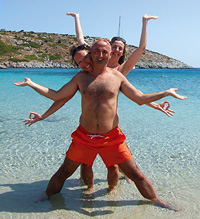
Skyros
An Ethical Philosophy
In a way, it's all Prince Charles' fault. Back in 1982, a couple of years before Atsitsa raised the flag of holism, he gave a speech in which he criticised modern medicine. By concentrating on smaller and smaller fragments of the body, medicine, he said, has lost sight of the patient as a whole human being. I can vividly recall my instant reaction to it - fascination. The rest of Charles' speech did not enamour me – Paracelsus, the sixteenth century alchemist whom the Prince quoted extensively in support of his point, is not my cup of tea.
But Charles' lecture reminded me of Hippocrates, the father of medicine, who would not treat a symptom without a full examination of the patient's whole condition which included even the political system of the city-state. This was not, however, just Hippocrates. The entire Greek culture was based on the same holistic premises, which, as my classical education had left embarrassing gaps, I proceeded to explore anew. The exercise was rewarding. The holistic concept which unfolded was one in which unity enhanced diversity, purpose underpinned freedom, and wholeness strengthened individuality. The whole for the Greeks was more than the sum of its parts.
This whole, including both the animate and the inanimate world, was a living entity possessing something like a rational cosmic soul which defied definition. This force was not God. It was, instead, the energy which nurtures the seed's transformation into a tree, and which, whatever the Gods might wish, would not allow the river to run back to its source. This energy, which the Greeks called Necessity, permeated the existence of both nature and humanity, and encompassed everything to which man's life was inseparably linked including the individual's own consciousness. It was what kept cosmos together as an orderly and beautiful arrangement. It did also lead to the identification of the individual with everything that is.
Physical reality, sensory perception and mental activity, blending with each other, were, thus, One, the "thing itself" which belonged as much to the world as to the individual. The humans had their place in it as much as it had its place in them. This is, incidentally, what distinguishes the Greek religious thinking from religions which turned the humans into the ‘slaves’ of the ‘Lord’. Considering that Necessity had to be understood rather than worshipped, this is also what gave birth to rationalism. But for the Greeks, rationalism was inseparable from morality. Necessity needed only the certainty that no element of the whole would be dominated by another or eliminated for good. The image is, perhaps, given by the four seasons of the year. They battle with each other, but eventually each one of them makes way for the other. Strife within the whole never ends as no party to it either can, or should be able to, dominate or obliterate its opposition. To do so would disturb the delicate balance of the whole and offend some sort of eternal order which has given everything its place. It would in this sense be hubris, and hubris was bound to be punished in what Solon, the Athenian statesman, called the ‘Court of Time’.
Click here to read more of this article.
www.skyros.com


